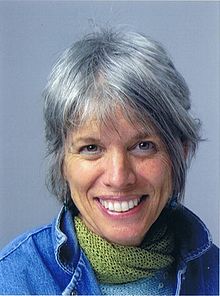Chellis Glendinning
| Chellis Glendinning | |
|---|---|
 |
|
| Born | 1947, Cleveland Ohio |
| Alma mater |
University of California, Berkeley Columbia Pacific University |
Chellis Glendinning is a North American author of creative nonfiction, radio producer, licensed psychotherapist (now in retirement), and social-change activist. She is noted as a pioneer in the field of ecopsychology, a proponent of bioregional land-based culture, and a critic of technological society having worked with such contemporaries as Jerry Mander, Vandana Shiva, Stephanie Mills, and Kirkpatrick Sale.
The inspiration for Glendinning´s literary explorations originally sprang from the work of U.S. scholar Lewis Mumford. Independent of both affiliation and insight, he provided an early systemic analysis of contemporary society. Glendinning´s writing has also been shaped by the themes of feminist literature in the 1970s, in particular, by the creative juxtapositions made possible by the insight that “The Personal Is Political.”
Her relations, some would claim noteworthy, include Thomas Hooker, founder of the colony of Connecticut; Dr. Frank E. Bunts, founder of the Cleveland Clinic; and the civil rights activist, her mother Mary Hooker Glendinning.
She has written seven books, as well as hundreds of essays for journals, magazines, and newspapers including , CounterPunch, ColdType, Race, Poverty and the Environment, and Guernica in North America. In Bolivia she writes for Le Monde Diplomatique Los Tiempos and or Nueva Crónica.
She was also featured in the 2007 documentary What a Way to Go: Life at the End of Empire.
In 2007 Glendinning’s bilingual folk opera De Un Lado Al Otro, was presented at the Lensic Performing Arts Center in Santa Fe, New Mexico, directed by Robert Castro with music composed and provided by Cipriano Vigil.
...
Wikipedia
